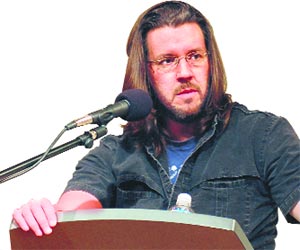A book of adult sanity
The New Yorker publishes excerpts from David F. Wallaces unfinished novel

The New Yorker publishes excerpts from David F. Wallaces unfinished novel
WHEN David Foster Wallace killed himself last September,his death shocked and saddened the literary worldand provoked immediate speculation about what posthumous work might emerge.
Last weeks The New Yorker offers at least a partial answer to that question. In a pile on Wallaces Claremont,California,desk when he died were nearly 200 pages from an unfinished novel called The Pale King,on which the author of Infinite Jest had worked for years. Much more material related to the novel turned up in Wallaces files.
monthly limit of free stories.
with an Express account.
The magazine is publishing a short excerpt from the novel as well as a long article on Wallace by D.T. Max that tells the story of the unfinished work. Michael Pietsch,Wallaces editor at Little,Brown,said in an interview that he had a tentative agreement with Wallaces agent to publish The Pale King in 2010.
The unfinished novel,Max writes,was in part Wallaces attempt to move beyond the self-consciously maximalist style of Infinite Jest. I think he didnt want to do the old tricks people expected of him, Max quotes Wallaces wife,Karen Green,as saying.
It was different from what he had written before, said The New Yorker fiction editor Deborah Treisman,though its also clear,from Maxs reading of part of the new work,that some of it recalls the expansive,trick-filled Wallace many readers came to love.
The unfinished novel did not surface for more than two months after Wallaces death,said his agent,Bonnie Nadell. Pietsch,who had been working with Wallace ever since he acquired Infinite Jest,flew to California in January to examine what he called the rather huge collection of manuscripts Nadell and Green had assembled. I had the uncanny experience of feeling joy where I expected to find grief, he said,because he could feel Wallaces presence in his astounding,levitating,daring work. Yet it was agony to realise that he was not here,and not here to finish it.
In a Wallace letter to novelist Don DeLillo,which hed obtained earlier for another article,Max noticed a line he hadnt paid attention to before: I believe I want adult sanity, Wallace had written,which seems to me the only unalloyed form of heroism available today.
Wallace had been on medication ever since his diagnosis of depression as an undergraduate. He decided to wean himself from the antidepressant Nardil in part,Max writes,because he thought the drug might be getting in the way of The Pale King.
The Pale King had many ambitions, Max writes. It would show people a way to insulate themselves from the toxic hyperactivity of American life. It had to be emotionally engaged and morally sound,and to narrate boredom while obeying the physics of reading. And it had to put over the point that the kind of personality that conferred grace was exactly the kind that Wallace did not have.
Bob Thompson,LATWP